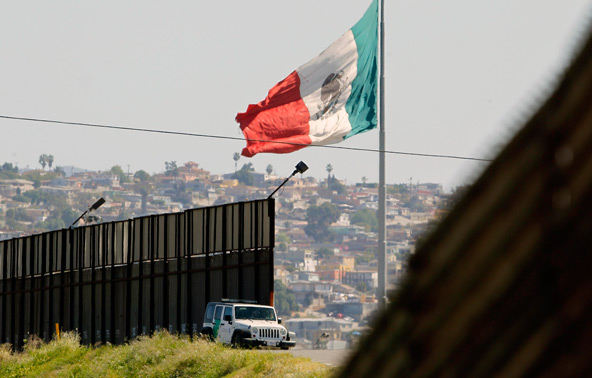
LOS ANGELES (CNS) — The archbishop of Los Angeles called upon the United States to remember the humanity of men, women and children in the country illegally or risk losing its soul.
Addressing the city’s Jewish community March 19, Archbishop Jose H. Gomez said the time has come for the U.S. to adopt comprehensive immigration to provide undocumented immigrants with a path to citizenship.
He also urged U.S. officials to end the practice of breaking up families through deportation.
The chairman of the U.S. bishops’ Committee on Migration called immigration reform “the most urgent civil rights question of our time.”
Archbishop Gomez, a native of Monterey, Mexico, recalled being an immigrant himself and how he became a naturalized citizen as a young adult in explaining the church’s support for comprehensive immigration reform.
He suggested to the audience at Sephardic Temple Tifereth Israel that immigration reform would be better addressed by Christian and Jewish leaders by invoking religious and moral terms and by recalling the religious principles upon which the U.S. was founded.
“One of the problems we have today is that we’ve lost our ability to talk about issues in religious and moral terms,” he said. “We are becoming a more and more secular society. And that makes it hard to talk about the values and commitments we find in America’s founding documents.”
Archbishop Gomez said the social justice movements that ended slavery in the 19th century, led to major civil rights gains in the 1960s and gave rise to today’s culture of life campaign are grounded in the nation’s Judeo-Christian heritage.
It’s time, the archbishop said, to return God to the debate on immigration and other concerns facing the country.
“We have lost the sense of the humanity of the men and women and children who are living in this country illegally,” Archbishop Gomez said. “That worries me as a pastor. I’m worried we are losing something of our national soul.”
Describing the U.S. as a great nation that readily turns to aiding people in need around the world, he questioned its treatment of undocumented immigrants.
“Yet this great nation finds itself today reduced to addressing this major issue in our public life through name-calling and discrimination, criminal profiling based on race, random identity checks, violent raids of workplaces and homes, arbitrary detentions and deportations,” he said.
Citing the deportation of 1.5 million people in recent years, Archbishop Gomez called for compassion.
“I am a pastor, not a politician. And to talk as a pastor, these are not statistics. These are souls. Human beings. We’re talking about fathers and husbands who, with no warning, won’t be coming home for dinner tonight and who may not see their families again for a decade at least. We are talking about a government policy that punishes children for the crimes of their parents.
“We are a better people than this. America has always been a nation of justice and law. But we are also a people of compassion and common sense. What we’re doing right now betrays our values and makes our country weaker and more vulnerable,” he said.
Thanking Jewish leaders for their leadership through the L.A. Council of Religious Leaders in seeking a just solution to the country’s burning immigration questions, Archbishop Gomez cited the words of Pope Francis who earlier in the day during his inaugural Mass called people to the vocation of “protector” by showing love and concern for every human being.
In thinking about immigration reform, the archbishop said his mind turns to the words of Moses during the exodus from Egypt in which he reminds the Jewish people not to oppress a stranger because they too were strangers in a foreign land.
“That’s what our society needs to hear right now,” Archbishop Gomez said. “Our society needs the heart of a stranger. This is our task. To be that beating heart. The heart of a stranger. We need to help our brothers and sisters to remember the founding vision of America. The vision of the Bible. The vision of the Gospel.
“We need to communicate this vision to our neighbors,” he continued. “This vision of God and this vision of the human person who is made in the image of God. Our society needs us to be the people of conscience. The people who remember and believe that in God’s eyes we’re all his beloved sons and daughters, and not one is a stranger to any of us.”






